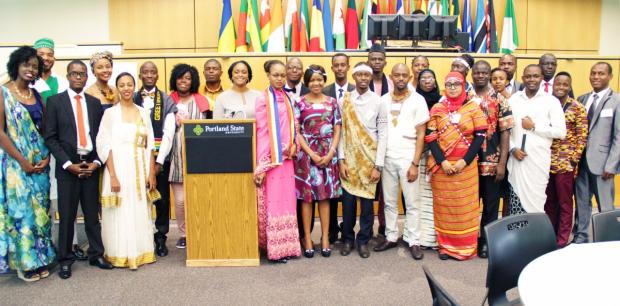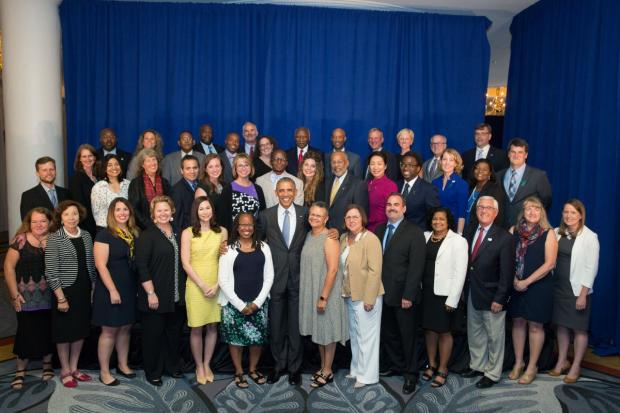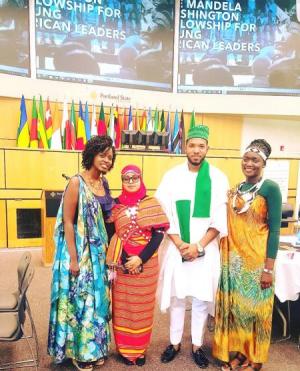Citizen Diplomacy and Conflict Resolution: The Mandela Washington Fellowship
Citizen Diplomacy and Conflict Resolution: The Mandela Washington Fellowship
Early this year I became the Director of the Mandela Washington fellowship at Portland State University in Portland, Oregon. This came about when I applied and won a State Department grant to host young professionals from sub-Saharan Africa. With my research interests in youth empowerment, civil society, human security, institutions of governance, and conflict management in sub-Saharan Africa, this undertaking was a natural fit as it involved working with innovative young people to tackle some of the most protracted issues in their communities.
The Mandela Washington fellowship, named after the iconic Nelson Mandela, started in 2014 as a citizen diplomacy program that aims to reset the proverbial diplomatic and cultural button between the U.S. and Africa by investing in the latter’s young professionals. It is the flagship program of President Obama’s Young African Leaders Initiative (YALI) that empowers young people aged between 25-35 through academic coursework, leadership training, and networking. In 2015, 50 percent of fellows were women representing all 49 countries in Sub-Saharan Africa. For 76 percent of the fellows, this was their first experience spending substantial time in the United States.
In 2016, the fellowship provided 1,000 outstanding young leaders with the opportunity to hone their skills at a U.S. higher education institution. Under the U.S.- based activities, each Mandela Washington Fellow took part in a six-week academic and leadership Institute at a U.S. university or college in one of three tracks: Business and Entrepreneurship, Civic Leadership, or Public Management. The second activity was the Presidential Summit where, following the academic component of the fellowship, the fellows visited Washington, D.C., for a Presidential Summit featuring a town hall with President Obama. During the three-day event, fellows took part in networking and panel discussions with U.S. leaders from the public, private, and non-profit sectors. The African-based activities, on the other hand, will focus on individuals returning to their home countries, where they will continue to build the skills they have developed during their time in the United States through support from U.S. embassies, four Regional Leadership Centers, the YALI Network, and customized programming from USAID and affiliated partners.
As the Executive Director of the fellowship program at Portland State University, my role is multifaceted. I oversee the overall design of the summer institute, including its programmatic and logistical components. I ensure that the academic component is rigorous enough and broad enough to cater to the wide-ranging backgrounds and educational experiences of the fellows, some of whom have graduate degrees. Most importantly I make sure that all of the elements (academic, community service, leadership skills development, cultural exchange) gel to meet the citizen-diplomacy benchmarks set by the State Department. I also act as the chief liaison with various stakeholders, including at the governmental and community levels respectively. Daily emails and weekly phone calls, whether with State Department folks or other stakeholders were core features of the 2016 program with close collaboration and coordination between these various actors playing a key role to the success of this years program. There is also a human resource element to my job. As the focal point for all new hires and training, I ensure that the program has the right number and calibre of staff to deliver an effective logistics-intensive program. My time at S-CAR could not have prepared me better for a position of this nature. Whether it was the courses I took on reflective practice, theories of conflict resolution, NGOs or human rights, they all helped me better understand human nature and the nuances of conflict and conflict analysis and resolution. When I got into this position, I quickly realised that any program that brings together people from different cultures, traditions, and backgrounds also brings with it opportunities for learning, personal growth, and thus understanding of ‘the other’. Conversely it also carries with it the potential for misunderstanding and conflict. The first cohort that I managed had 25 fellows from 21 countries, almost equally split along gender lines. There were Muslims and Christians, environmental activists, urban planners, human rights advocates, and local government officials. Despite such wide-ranging background and interests, they were all held together by their desire to contribute to the common good and by their enthusiasm to promote the quality of life in their communities. Not surprisingly, the atmosphere was generally one of mutual respect. My in-depth conflict resolution skills also came in handy as I was ideally placed to help resolve any issues. We successfully did this by addressing not just the causal factors but also the underlying issues over which people disagreed. Through the use of effective inter-cultural communication skills as well as adopting a sensitive approach to gender and cultural differences, we were able to help the fellows navigate their differences before it escalated into conflict. By re-emphasizing tolerance and mutual respect fellows were able to work out issues between themselves. One of the most important tools that I have been able to put to use in this job is that of reflective practice. A complex program of this nature has many moving parts. Getting all of these parts to sync required ‘thinking in action’, addressing issues, modifying approaches while the program unfolded. The single loop, double loop, and triple loop learning techniques taught by the late Wallace Warfield has helped me become a proactive administrator in delivering a high intensive program of this nature, one that empowers while promoting peace and cultural understanding.
My time at S-CAR could not have prepared me better for a position of this nature. Whether it was the courses I took on reflective practice, theories of conflict resolution, NGOs or human rights, they all helped me better understand human nature and the nuances of conflict and conflict analysis and resolution. When I got into this position, I quickly realised that any program that brings together people from different cultures, traditions, and backgrounds also brings with it opportunities for learning, personal growth, and thus understanding of ‘the other’. Conversely it also carries with it the potential for misunderstanding and conflict. The first cohort that I managed had 25 fellows from 21 countries, almost equally split along gender lines. There were Muslims and Christians, environmental activists, urban planners, human rights advocates, and local government officials. Despite such wide-ranging background and interests, they were all held together by their desire to contribute to the common good and by their enthusiasm to promote the quality of life in their communities. Not surprisingly, the atmosphere was generally one of mutual respect. My in-depth conflict resolution skills also came in handy as I was ideally placed to help resolve any issues. We successfully did this by addressing not just the causal factors but also the underlying issues over which people disagreed. Through the use of effective inter-cultural communication skills as well as adopting a sensitive approach to gender and cultural differences, we were able to help the fellows navigate their differences before it escalated into conflict. By re-emphasizing tolerance and mutual respect fellows were able to work out issues between themselves. One of the most important tools that I have been able to put to use in this job is that of reflective practice. A complex program of this nature has many moving parts. Getting all of these parts to sync required ‘thinking in action’, addressing issues, modifying approaches while the program unfolded. The single loop, double loop, and triple loop learning techniques taught by the late Wallace Warfield has helped me become a proactive administrator in delivering a high intensive program of this nature, one that empowers while promoting peace and cultural understanding.




